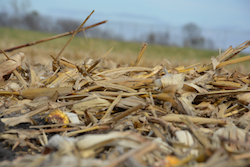The U.S. Department of Energy (DOE) has announced up to $11.3 million in funding to develop flexible biomass to hydrocarbon biofuels conversion pathways. The goal is for these roads, per se, to be able to be easily modified to produce advanced biofuels and/or bioproducts, depending on market demand. Using a DOE example, one pathway could consist of a route to a platform chemical that could be converted to products or renewable fuels. Another idea is a pathway that co-produces both biochemicals and advanced biofuels rather than one or the other at any given time.
The grants are being funded specifically through the Bioenergy Technologies Office (BETO) who has a goal of meeting the 2022 cost target of $3/gallon of gasoline equivalent (gge) for the production of renewable hydrocarbon fuels from lignocellulosic biomass.
One approach BETO has taken previously to achieve this goal is to focus on conversion pathways that produce biofuels, with little or no emphasis on coproducing bioproducts. However, with the knowledge that adding the production of co-products or value-added chemicals and products can help incentivize the de-risking of “front-end” processes required to convert the biomass to biofuels, BETO is also looking to expand to pathway to product process.
Therefore, the intent of the funding is to identify research and development (R&D) projects that propose a conversion pathway that may flexibly produce bioproducts and biofuels. According to BETO, the proposed pathway must illustrate a realistic approach to producing cost-competitive renewable hydrocarbon biofuels. These pathways could consist of a route to a platform chemical that could be converted to products or fuels, or a route that coproduces chemicals and fuels. Successful applications will include a clear justification for producing the target molecule(s) from biomass, a compelling narrative explaining how the target product(s) will enable biofuels, and supporting techno-economic analysis and life-cycle analysis.
Interested parties can learn more about this opportunity and application requirements here. Applications are due February 26, 2016. An informational webinar for potential applicants will take place at 3:00 p.m. Eastern Time, Feb. 16, 2016. A recording of the webinar will be posted on the EERE Exchange website.


